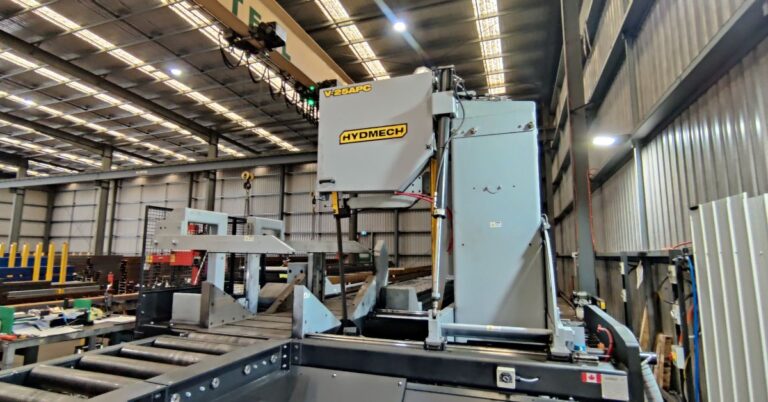Setting up a metal work Business
Top Tips to get you set up

So, you have decided to set up your own metal work business and are feeling excited and overwhelmed all at once. When you are initially setting up your business, whether you are an old hand or just getting started, there are the key aspects of machinery to think about when ensuring your set up is efficient, safe and scalable..
essential machines for every metal work business
1. CNC Press Brake
2. Metal Bandsaw
Metal bandsaws are designed to cut through various types of metal with precision and efficiency. You have the option of automatic, semi-automatic or manual (Read more about the difference between each type of saw here). Metal bandsaws are commonly used for trimming raw stock, cutting structural steel, and sizing sheet metal components.
Tip: Choose the type of bandsaw based on your budget, specific needs and the volume of work you expect to handle. Chose a bandsaw that is good quality so you aren’t replacing it after a few years.
3. Metal Shears (AKA Metal Guillotine)
4. Plate Rolling Machine
Plate bending rolls are essential for creating both simple and complex curves, making them indispensable in modern metal fabrication processes. They can handle a wide range of materials and allow for smooth, even bends with minimal distortion.
Tip: Choose a machine with which suits your needs, workshop size and budget.
5. Section Rolling Machine
Metal section rolling machines are used for shaping and forming cylindrical shapes, such as curves, arches and complex profiles from flat sheets. Section rolling machines are indispensable in producing metal components for a wide variety of applications, including structural steelwork, architectural designs, and industrial machinery.
Tip: Choose a machine with adjustable rollers and digital controls (CNC) for consistent results.
6. Panbrake Folder
Folding machines, or panbrake folders, are used to create precise bends in sheet metal and offer a solution that is both precise and controlled, which is important when producing high quality metal work. They are particularly useful for producing boxes, trays, and other complex shapes.
Tip: Look for machines with adjustable folding angles and depths to accommodate a variety of projects.
7. Laser Cutting Machine
Laser cutting machines offer high precision and efficiency, making them ideal for intricate designs and tight tolerances. They are versatile and can cut through various materials.
Tip: Ensure the machine has a suitable wattage for your material thickness range and that it integrates well with your CAD/CAM software for seamless operation.
8. Welding Equipment
Welding is a fundamental process in metal fabrication. Depending on your specific needs, you might require:
- MIG Welders: Suitable for high-speed welding of thin to medium-thickness materials.
- TIG Welders: Ideal for precise, high-quality welds on thin materials.
- Stick Welders: Versatile and robust, suitable for outdoor and heavy-duty applications.
Tip: Invest in quality welding machines and ensure operators are trained to handle them safely.
9. Additional Essential Tools and Equipment
Beyond the main workshop machines suggested, you might want to invest in a metal drill, length measuring tables for your saws, a cold saw or aluminium saw or even set up using second hand machines to reduce your initial outlay.
metal work business Layout and Infrastructure
Consider the following if you would like to ensure your workshop prioritised safety and productivity:
- Workflow Design: Ensure machines that are used concurrently, or one after the other are located next to each other to minimise handling and ensure timely production schedules.
- Space Allocation: To ensure safe operation, allow each machine a clear workspace and ensure they can be accessed for the purposes of maintenance.
- Lighting: Ensure adequate lighting to reduce eye strain and increase safety of the operator.
- Electrical and Gas Supply: Ensure your workshop has the necessary power and gas connections to support your equipment. We recommend three-phase power outlets.
Tip: use a professional design your workshop space to ensure it is optimal for your needs.
Safety Considerations
Safety should be a top priority in any workshop:
- Personal Protective Equipment (PPE): Ensure all machine operators are attired in PPE adequate for their role, including gloves, safety glasses, face shields, and hearing protection. Appropriate footwear should also be used at all times.
- Machine Guards: Choose machines that come with safety guards installed, or on machines to prevent accidental contact with moving parts.
- Training: Provide regular training on machine operation and safety protocols to all staff members.
- Emergency Procedures: Clearly mark emergency exits and provide accessible first-aid kits.
Tip: Regularly review and update safety procedures to comply with local regulations and industry best practices.
final considerations
- Regulations: Familiarise yourself with Australian Standards (AS) and Occupational Health and Safety (OHS) regulations relevant to sheet metal and steel fabrication.
- Suppliers: Get to know local suppliers, the saying ‘it’s not what you know but who you know’ is very relevant in business, especially when purchasing materials at great prices, and looking for spare parts.
- Networking: Join local networking groups, both face-to-face and online, and consider becoming a member of your National industry body to keep up-to-date with industry news and updates.
Tip: Investigate government grants and incentives available for manufacturing businesses to support your setup and growth.
Conclusion
Setting up a metal work business involves careful planning and investment in the right machinery and infrastructure. By prioritising essential machines, optimising your workshop layout, ensuring safety, and utilising any Government assistance that is available, you can establish a successful, productive business in the sheet metal and steel fabrication industry. The decisions you make today will inform the efficiency, quality, and profitability of your business in the future.
If you need assistance sourcing equipment or designing your workshop layout, feel free to reach out to our team (call us on (02) 8445 8555 or email your requirements) for expert guidance tailored to your specific needs.
